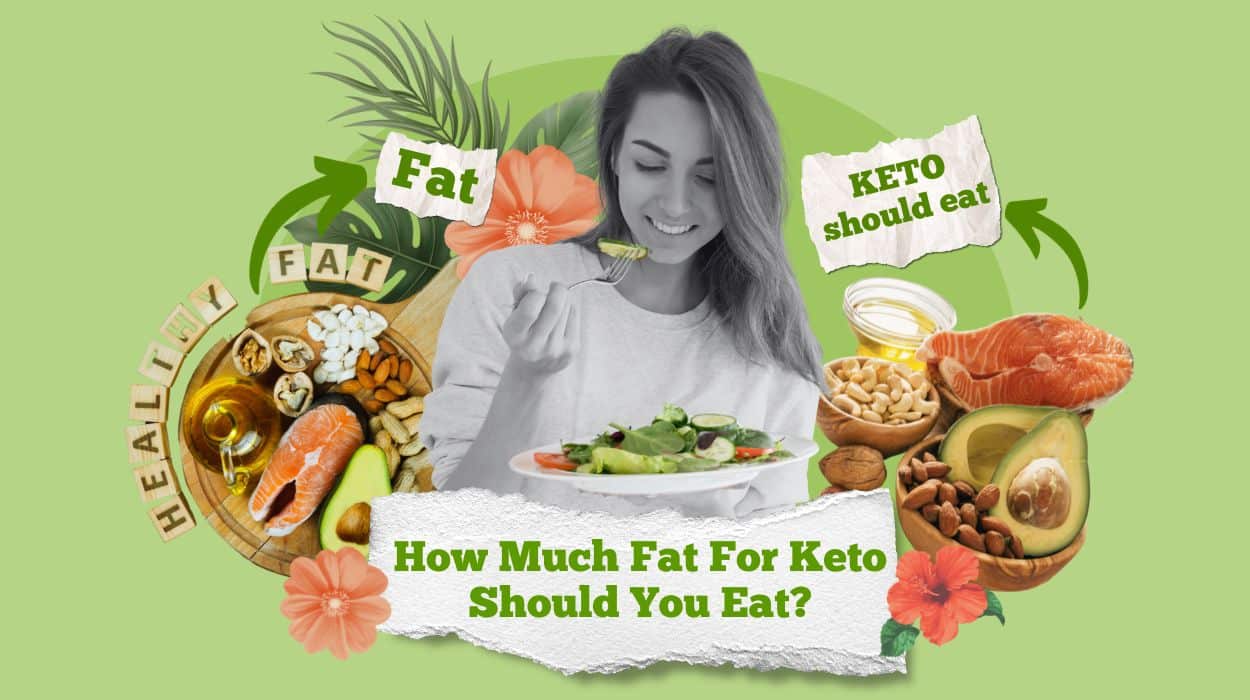Success in the ketogenic diet requires you can answer this question: “How much fat should I eat on keto?” and then start planning and knowing your personalized macronutrient (macros) requirements including fat, protein, and carbohydrates. Not all fats are the same. We will break down the types of fats and what to look for when planning meals and snacks for keto.
Balancing nutrients is crucial for achieving ketosis and reaping the full benefits. Understanding how to leverage macros for weight loss and meeting your personal needs can make a substantial difference in the success of your ketogenic journey. We will discuss how much fat you should eat, why fat is important, and what kind of fat is good for you for a keto diet to lose weight.
How Much Fat For Keto Should You Consume?
Out of all the calories consumed from food in a day, a standard keto diet recommends 75% of those calories originate from fat. To successfully follow a keto diet, you need to balance nutrients and know which are the best fats for your individual needs.
How Much Fat Should I Eat On Keto?
The three macronutrients that make up the food we eat are protein, fat, and carbohydrates. A traditional ketogenic diet is high in fat, moderate in protein, and very low in carbs. The standard ketogenic diet[1] typically has about 75% fat, 20% protein, and 5% carbohydrates. These numbers are adjusted to meet individual needs.
Only when you restrict carbohydrate intake to less than 50 grams per day will the body fat enter ketosis and start to burn fat for energy. This limit is equivalent to two or three slices of white bread. On the other hand, one of the benefits of almonds is their low carbohydrate content. You would need to eat 4 cups of almonds[2] to reach your carb limit on a keto diet.
To organize your keto diet, start by following the standard ketogenic guidelines for carbohydrate, protein, and fat intake. To determine individual needs, factor in your weight, height, activity level, and goals.
How To Calculate Your Personal Macros
- Determine your daily calorie requirement based on your metabolism and activity level. A nutritionist can do this or there are many online calculators.
- Set your carbohydrate limit to reduce carb intake. The diet requires less than 50 grams per day, but you may be stricter.
- Establish your protein intake. The World Health Organization recommends[3] a minimum of 0.37 grams of protein per pound of body weight every day. This minimum is about 15% of your daily diet. Individuals who require high-protein diets may double or triple this minimum.
- Calculate your fat requirement. The remaining daily calorie needs will come from fat. Use the U.S. Department of Agriculture’s published values to calculate how many grams of fat you need. Carbs provide 4 calories per gram, protein has 4 calories per gram, and fat provides 9 calories per gram.
- Update and adjust your macronutrient requirements as you progress in your low-carb diet.
Why Is Fat Important For Keto?

In a low-carbohydrate diet, dietary fat and protein become much more important. The keto diet embraces fat as the body’s primary source of energy. Protein is used to balance the diet by supplementing extra energy, vitamins, and minerals.
The primary goal of the ketogenic diet is to shift the body into a state of ketosis, where it burns fat stores for fuel instead of carbohydrates. Choosing healthy fats[4] is important in a high-fat diet to promote a healthy heart and get the proper nutrients. Therefore, some less healthy fats to avoid are trans fats.
Is avocado a superfood that you need for keto? Avocados[5] are great because they are full of healthy fat, vitamin C, vitamin E, Vitamin K, potassium, and fiber. This is a great example of a low carb healthy fat with the right nutrients and fiber that you need in a keto diet. Look for foods like avocados with similar benefits and are minimally processed.
Following low-carb diets entails abstaining from indulging in delectable sugary treats, but this isn’t problematic when it comes to high-fat diets as they can provide equally gratifying alternatives with delightful textures and flavors. In addition, they take longer to digest, resulting in prolonged satiety, sustained energy levels throughout the day, and reduced food cravings.
Kind Of Fats You Should Eat On A Keto Diet
Selecting healthy fats is vital for maintaining a healthy and effective ketogenic diet. Here are some types of fats you will encounter and recommendations for use in the keto diet to start your weight loss journey:
Healthy Fats
- Monounsaturated Fats. In studies with increasing intake to 20% of daily calories from monounsaturated fat,[6] such as from olive oil, nuts, and seeds, there was no increase in risk for cardiovascular disease or cancer.
- Polyunsaturated Fats. The other fat commonly found in foods from the Mediterranean diet such as olives, nuts, and seeds, is associated with positive health outcomes.[7] Studies show that reducing saturated fat and trans fat, while consuming more unsaturated fat decreases the risk for cardiovascular disease and cancer.
Unhealthy Fats
- Saturated Fats. Current U.S. guidelines limit saturated fat,[8] such as coconut oil, to less than 10% of daily calories. Put into context with a keto diet, research shows that replacing carbs with saturated fat doesn’t result in higher levels of saturated fat in the bloodstream. A limit may exist but hasn’t been established.
- Trans Fats. Trans fat, which is found in processed foods, fried foods, and shortening, is the fat you want to avoid. Read the nutrition labels or stick with unprocessed foods to be certain.
Fat Consumption On Your Keto Diet

While the high-fat nature of the keto diet is a distinguishing feature, it is important to follow your plan. Your daily grams of fat are limited by your daily caloric needs and the balanced quantity with your carbohydrate and protein intake. Consuming beyond your limits can hinder weight loss and negate the benefits of a keto diet.
Listen to your body and pay attention to signals for hunger and fullness. Don’t force yourself to eat if you are full. Monitor your progress and adjust your plan as your body adapts to the ketogenic diet. Experimentation is required at first to find the best foods that meet your nutrient needs and satisfy you.
Apart from naturally balancing your keto diet, consider incorporating supplements to support your nutritional needs. Supplements can vary by quality, reputation, and price.
Conclusion
In conclusion, making a plan and counting your macronutrients is key to success on the ketogenic diet and your weight loss journey.
Understanding the different types of fats and the best ones for your individual needs will take time to learn at first, but the effort pays off in the long run. Remember, monounsaturated fats and polyunsaturated fats are ideal. Avoid trans fat and saturated fats in your choices for high-fat foods.
Ultimately, finding the right combination of whole foods and potentially incorporating supplements is a process that takes experimentation and time. Be mindful of your body’s signals and discuss any concerns with a doctor or a dietician. Prioritize whole foods and learn as much as you can to support your journey towards a healthier you.
Frequently Asked Questions
Some indicators of ketosis are bad breath, upset stomach, headache, constipation, difficulty sleeping, and low energy. Testing for ketones in the blood or urine is possible too. These symptoms may resolve as the body adjusts to the diet.
A variety of fresh food is ideal. Plan your meals to incorporate many types of macronutrient sources throughout the week. Different fruits provide different nutrients as do different meats such as fatty fish and chicken.
In ketosis, the body is burning fat, thus raising the limit for regular fat intake. However, some sources of saturated fat (mainly animal sources) may raise your cholesterol, which leads to higher cardiovascular risks. Consult a doctor or dietician before starting keto if you or your family have a history of cardiovascular disease.
 Expert's opinion
Expert's opinion
